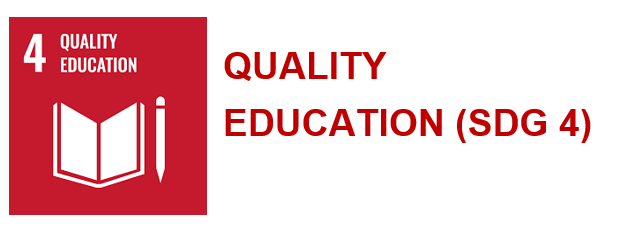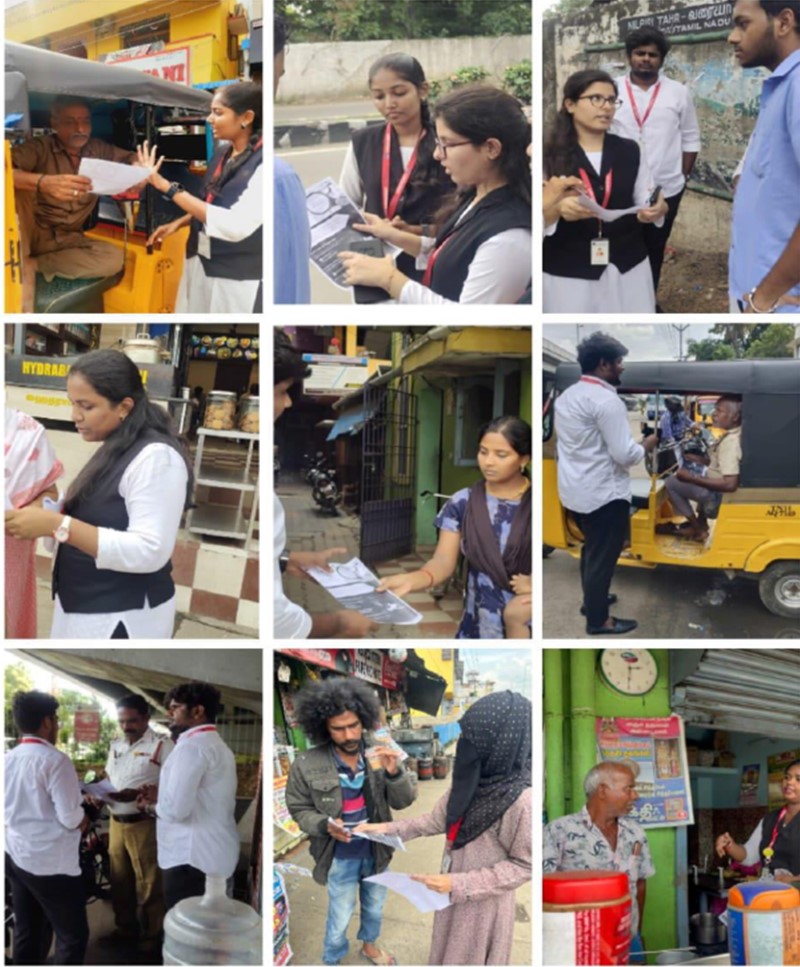Crescent Sustainability Initiatives

B.S. Abdur Rahman Crescent Institute of Science and Technology (BSACIST) has demonstrated a strong commitment to promoting lifelong learning by ensuring that educational resources are accessible to all individuals, regardless of their background. This initiative aligns with the university’s mission to foster an inclusive educational environment that supports continuous learning and community engagement. BSACIST is deeply committed to SDGs related to Quality Education (SDG 4), Industry, Innovation and Infrastructure (SDG 9), Sustainable Cities and Communities (SDG 11), and Reduced Inequalities (SDG 10) through inclusive outreach and STEM capacity building, prioritizing inclusive, quality education for all.
Crescent Legal Aid Cell
“Empowering Communities, Ensuring Justice”
Crescent Legal Aid Cell believe in the transformative power of Legal Aid, operating under the esteemed Crescent School of Law, B. S. Abdur Rahman Crescent Institute of Science & Technology, Chennai. We are committed to social justice, providing accessible legal assistance, fostering awareness, and making a positive impact in the lives of individuals and communities in need.
Crescent Legal Aid Cell serves as a beacon of hope, bridging the gap between justice and those in need. Our dedicated team of passionate faculty members, skilled lawyers, and compassionate student volunteers works tirelessly to ensure that justice is not a privilege, but a right for all. With a focus on promoting social justice, we strive to empower individuals and create a more equitable society.
This legal awareness programme exemplifies Crescent School of Law’s commitment to promoting legal knowledge and community involvement, demonstrating the institution’s dedication to providing open access to educational resources and facilities to the wider community. The law school’s campus facilities, including its moot court hall, legal aid clinic, and library resources, were made freely accessible to local community members during this initiative, breaking down barriers between academic institutions and the public.
The proactive measures taken by the students in preparing and disseminating educational materials significantly enhanced the outreach of the programme, while utilizing the institution’s state-of-the-art facilities. The law school’s commitment to public engagement is evident through its policy of opening campus spaces for community learning, including providing access to:
- Legal databases and digital resources
- Conference facilities for public workshops
- Library services for community research
- Meeting rooms for legal consultations
- Computer laboratories for digital literacy
By empowering the local community with knowledge, resources, and unrestricted access to campus facilities, this initiative marks a successful effort in fostering a culture of vigilance and legal awareness. The programme showcases how educational institutions can serve as community hubs, making their facilities and expertise available to the public, thereby contributing to lifelong learning opportunities and educational equity.

Figure IV (3.1) –10: Engaging with the community: Law students educating on Legal Awareness
To ensure that access to various facilities, resources, and activities is accessible to all (Faculty, staff, students, alumni and public) regardless of ethnicity, religion, disability, immigration status or gender. To start Libraries/Digital Libraries and reading rooms for the use of the Public in general. These objectives were extracted from the Memorandum of Association of the sponsoring body of the Institution and the Rules and Regulations of the statutory body implemented by the Institution. The University takes great pride in making the world know that the resources of the University can be used even by persons who are not studying on campus. The facility is open to all irrespective of any discrimination. Therefore, the University envisages the promotion of not only its students but whoever is interested in educating themselves. The aim is precisely, the welfare of society as a whole. For the same reason, it provides huge access not alone to the library but also to the online courses, video lecture materials and other facilities which students/the public want to access. Any student who is endowed with intellectual ability is promoted and encouraged to navigate his skills and achieve great success. The University has been organizing events in the public domain by conducting public lectures, various events, and educational events and ensure maximum public participation. The University also offers vocational training to the public, free of cost and this has enabled many persons to secure jobs and earn their livelihood. Many families are benefitted from this and in this way the University ensures that it is always in the service of the community. The various departments of the University have also organized many extension activities beyond the campus which has benefitted the students in the nearby schools, the people of small hamlets in the vicinity of the University, the small towns and the city areas which is appreciated by the people who are the beneficiaries of such activities. Last but not the least, the University takes pride in providing access to education to all, those who seek knowledge and wisdom, regardless of their ethnicity, religion, community gender or disability. This was the vision and mission envisaged by its founders.
There are a total of about 190 video lectures, 53 PPTs & 68 pdf files developed for different courses by our faculty members of all the departments.
These lectures are available for public access to enhance life-long learning skills.
Public users can access the course materials through the URLs of the respective department e-learning portal as given below.
School of Mechanical Sciences:
School of Infrastructure:
School of Social Sciences and Humanities:
Crescent School of Pharmacy:
School of Physical and Chemical Science:
Crescent School of Business:
School of Electrical and Communication Sciences:
School of Computer Information and Mathematical Sciences:
School of Life Sciences:
Others:
Library Public Resources
Click here to view the Website
eBooks
The revolution, which took place in information and communication technology (ICT) has made a paradigm shift in the route to access library & information centres. Realizing the importance of e-access and its advantages, the library has shifted its focus towards open access as well paid subscription to e-Books.
e-Journals
PhD Theses of B S Abdur Rahman Crescent Institute of Science & Technology
E-Theses
OLD QUESTIONS
E-Patents
| Canadian, European, Indian Patent design and trademark office, Internet sites for patent search, United States, WIPO PCT database |
E-Reference
Free Online Courses
E-NewsPaper
About 10,000 newspapers worldwide
Free Online Courses
| Swayam, NPTEL, Coursera, Khan Academy, Edx, Academicearth |
Research Support Resources
Plagiarism
| About Plagiarism, Turnitin – Plagiarism Checker |
Journal Finder
Journals List
| Scopus Indexed Journals, Web of Science Indexed Journals, UGC CARE Journals |
Reference Management Tools
| Mendeley, EndNote, ReadCube Papers, Zotero |
Writing Tools
| Grammarly, Wordtune, Prowritingaid, Ginger |
Citation Generator
| Citation Machine, Bibliography, Easy Bib |
Fellowships and Scholarships
Learning Support Resources
| National Digital Library, One India One Digital Platform, Spoken Tutorial, NPTEL, SWAYAM e-PG Pathshala, Virtual Labs, Talk to Teacher |
Study Materials for Competitive Exams
| ICT Initiatives of Ministry of Education, Government of India |
| Copyright Guide for Indian Libraries |
Resources on Demand
The main objective of ‘Resources on Demand’ scheme is to empower the rural community by providing authentic information to support their day-today life. Keeping the above in mind, the Central Library will provide resources / information without violating the copy-right act. Those who need any resources are requested to contact the Librarian at librarian@crescent.education
Conclusion: A Vision for Inclusive Education
The various initiatives undertaken by B.S. Abdur Rahman Crescent Institute of Science and Technology reflect a robust commitment to lifelong learning and community engagement. By providing free access to educational resources and actively involving the community in learning opportunities, the university is not only fulfilling its mission but also contributing to the broader goal of educational equity and social welfare. The vision of the founders continues to guide the institution in its efforts to serve society and promote knowledge for all.
Policy for Life-Long Learning Access
Policy Document
Issue : 04; Revised on 2023
| Policy Created on | July 2009 |
| 1st Revision amended on | IQAC Meeting held on 27th October 2017 |
| 2nd Revision amended on | IQAC Meeting held on 31st March 2021 |
| 3rd Revision amended on | IQAC Meeting held on 16th June 2023 |
Responsible Executive : Director (IQAC)
Responsible Office : Internal Quality Assurance Cell, Student Affairs, Estate Office, Academic Office, Library and SDG Cell
Contacts : Registrar, Director (IQAC)
The revised policy has been approved in the 18th Meeting of the Internal Quality Assurance Cell (IQAC) held on 16.06.2023.
1. Statement of Policy
The B.S. Abdur Rahman Crescent Institute of Science and Technology is committed to ensuring inclusive and equitable quality education and promoting lifelong learning opportunities for all. This policy aims to enhance access to educational resources and foster a culture of continuous learning, aligning with the United Nation’s Sustainable Development Goal 4 (SDG 4).
2. Objectives
- Equitable Access: Ensure that all individuals, regardless of gender, socio-economic background, race, religion, or disability, have access to quality education and lifelong learning opportunities.
- Community Engagement: Actively involve the local community in educational initiatives, promoting awareness and participation in lifelong learning programs.
- Resource Availability: Provide free access to educational resources, including libraries, digital materials, and workshops, to facilitate continuous learning.
3. Policy Principles
- Lifelong Learning Opportunities: The Institute will offer a range of programs, workshops, and resources aimed at enhancing skills and knowledge for individuals of all ages.
- Inclusivity: All educational initiatives will be designed to be accessible to diverse populations, including marginalized and underrepresented groups.
- Public Engagement: The Institute will extend its facilities and resources to the community, ensuring that educational opportunities are available to all.
4. Lifelong Learning Measures
4.1 Public Resources (Lifelong Learning)
- Access to Campus Facilities: The Institute will provide free access to its facilities, including libraries, computer labs, and meeting spaces, for community members and local organizations.
- Special Coaching Programs: Organize coaching sessions for higher secondary students, focusing on subjects requested by local schools, conducted in both on-site and online formats.
4.2 Workshops and Training Programs
- Vocational Training Events: Conduct workshops on relevant topics, such as technology, legal awareness, and design, to enhance practical skills and knowledge in the community.
- Collaborative Learning: Encourage partnerships with local schools and organizations to facilitate educational outreach and skill development initiatives.
4.3 Online Resources and Open Access
- Digital Learning Materials: Provide open access to educational materials, including video lectures, course notes, and research papers, to promote self-directed learning.
- Online Courses: Develop and offer online courses that cater to various interests and skill levels, ensuring accessibility for all learners.
4.4 Community Engagement Initiatives
- Educational Outreach Activities: Organize events and competitions for local school children, fostering a connection between higher education and the community while promoting early learning.
- Legal Aid and Awareness Programs: Offer legal education and resources to community members, ensuring access to justice and legal knowledge.
5. Monitoring and Evaluation
The effectiveness of the lifelong learning measures will be regularly assessed through participant feedback and community engagement metrics. Adjustments will be made based on evaluations to improve the policy’s impact continuously.
This revised policy document reflects the commitment of B.S. Abdur Rahman Crescent Institute of Science and Technology to promote lifelong learning and educational equity. By implementing these measures, the Institute aims to empower individuals and communities, contributing to the broader goals of sustainable development and social welfare.



